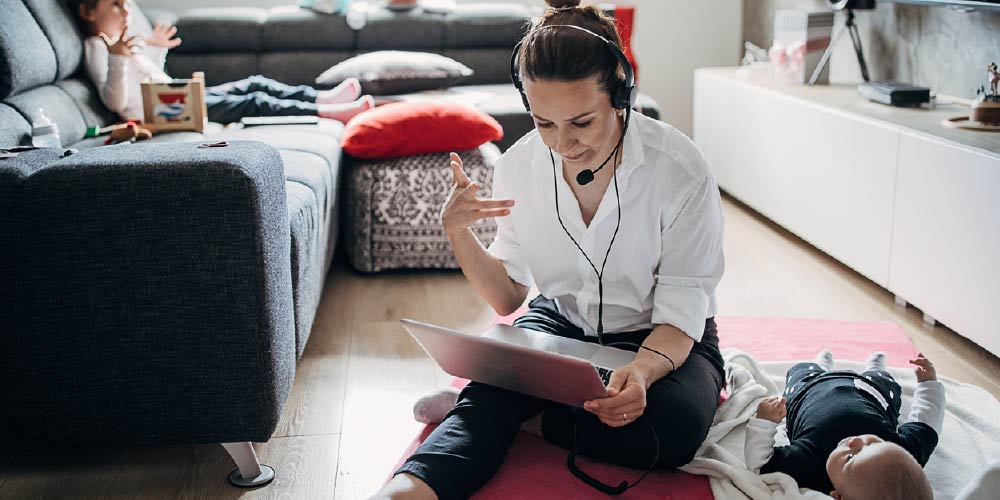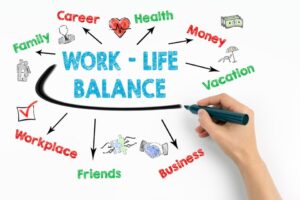Maintaining a good work-life balance has become hard in today’s fast-paced, always-connected world. So many people battle to balance the needs of their personal and work lives, which can lead to stress, burnout, and a lack of happiness. Achieving the right mix is important for staying healthy, happy, and productive, as well as lowering your stress. Managing your time, setting limits, and putting your health first are all important parts of finding this balance.
Drawing Lines Between Work and Personal Life
Setting clear limits between work and personal time is an important part of having a good work-life balance. Without these boundaries, work can easily dominate your personal life and vice versa. When people work from home or in a mixed setting, the lines can get even less clear. To keep things in order, set aside a place that you will only use for work. Make an effort to turn off work emails, texts, and calls when you’re not actually working. You can focus on your personal life and recharge without being interrupted if you set clear work hours and promise to stop working when those hours are up.
Setting Goals for Your Time
To balance work and life, you need to be good at managing your time. You need to set priorities and plan your time well if you want to be productive at work and still have time for family, friends, and hobbies. Find the most important things to do every morning and do them first. To plan your day and remember what you have to do, use journals, schedules, or apps. You’re more likely to stay on top of your tasks and not feel too busy if you set priorities for important things at work and at home.
Taking Breaks: How Rest Can Help
People often think that working longer hours will help them get more done, but taking breaks more often can actually help them get more done. Focussing for long amounts of time without taking a break can hurt your performance and make you feel more stressed. During the job, make sure you take short breaks. Get up from your work, stretch, go for a walk, or just close your eyes and take a few deep breaths. These short breaks help your body and mind feel better, which helps you stay focused and energised. Additionally, make sure you take longer breaks when you need to, like a lunch break or taking a weekend off to fully relax and recharge.
Being Able to Say “No”
Learning to say “no” is a big part of finding a good work-life balance. A lot of people find it hard to say no to requests at work or in their personal lives because they don’t want to let others down or miss out on chances. But saying yes to every request or duty can make you tired and cause you to forget about your own needs. Know your boundaries and be honest about how available you are. It’s not a sign of weakness to say “no.” It’s a way to protect your time and health. You can focus on the things that really mean to you when you say “no” when it’s the right thing to do.
Giving Tasks to Other People
You can quickly become stressed out and tired if you try to do everything yourself, whether you’re at work or at home. To keep things in balance, you need to learn how to give jobs to other people. At work, give people jobs they can handle, and don’t be shy about asking for help from your coworkers or team. Share housework duties with family members or roommates when you’re not at home. Giving other people help with your tasks can give you more time and energy to do other things, which can help you relax and find a better work-life balance.
Taking Care of Yourself
Taking care of yourself is an important part of keeping a good work-life balance. It’s easy to forget about your own needs when you’re busy with work and other people. But taking care of yourself is important for being happy and productive in the long run. Spend time working out, eating well, getting enough sleep, and doing things that help you rest and relax. Take care of yourself by doing things like reading a book, going for a walk in the woods, or meditating. Take care of your physical and mental health. It will help you handle the stresses of work and personal life better.
Being able to bend and adapt
Structure is important for a good work-life balance, but being able to change things around is just as important. Things can go wrong in life, and there will be times when you need to focus more on your work or personal duties than normal. It’s okay to change your plans or goals during these times. Be willing to change with the times, whether that means working longer hours to meet a goal or taking time off to care for a family member. Understanding that balance is a process that changes over time will help you stay stress-free and find an answer that works for you at any given time.
Putting together a support system
Having a strong network of support can make it much easier to balance work and personal life. Surround yourself with family, friends, and coworkers who will support you, know how important balance is, and can help you when you need it. Tell them about your problems and your successes, and don’t be afraid to ask for help or suggestions. It’s also important to be able to talk to your boss freely. Talk about your personal obligations and work load to make sure that standards are reasonable and doable. Having people to lean on lets you share the load and feel more sure about handling your personal and professional duties.
Smart Use of Technology
Technology can help you organise your work and personal life, but it can also hurt you. It can make things easier and help you keep track of things, but it can also link you to your desk all day. To deal with this, use technology to your advantage by using apps and productivity tools that help you keep track of due dates, stay on top of chores, and plan your personal schedule. Also, make rules for how you use your digital gadgets. When the workday is over, turn off messages for apps that are linked to work, and don’t check your email when you’re not supposed to.
Value Quality Over Quantity
In both work and personal life, quality is more important than number a lot of the time. At work, you should focus on doing good work instead of taking on too many jobs that could hurt your performance. Do not try to attend every event or meet every commitment in your personal life. Instead, focus on activities and relationships that are important to you and make you happy. Focussing on quality will not only make you happier, but it will also have a bigger effect on both parts of your life.
We are trying to find balance.
A good work-life balance isn’t something you do once and are done with. It’s a process that takes time, effort, and self-awareness. Setting limits, being smart with your time, putting yourself first, and making friends can help you feel less stressed, get more done, and live a happier, more fulfilling life. Remember that balance means making choices that are in line with your morals and goals. By focusing on what’s important and treating yourself with kindness along the way, you can create a life that supports both your professional success and your personal happiness.




